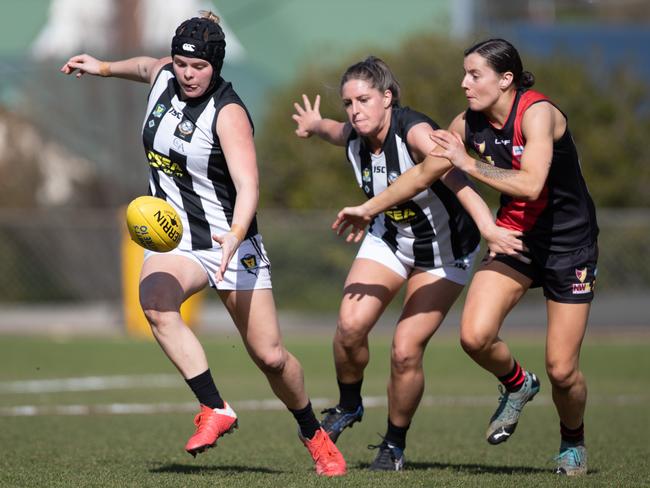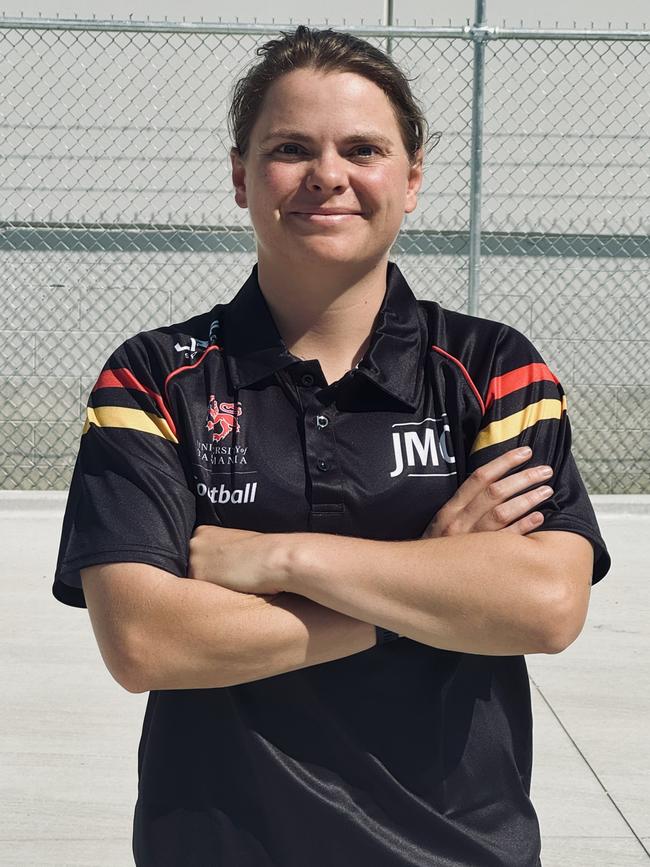SFLW University coach, South Hobart goalkeeper Jenna Farrow on concussion issues
The ongoing effects of concussion have forced one of Tasmania’s most talented sports stars to make a heartbreaking decision to stop playing the sport she loves. But it has also presented an exciting new challenge as JAKE GARLAND discovers.
Sport
Don't miss out on the headlines from Sport. Followed categories will be added to My News.
Hearing the words “you’ve got to give up footy”, would break those in the prime of their career — not Jenna Farrow.
The dual-code sporting star was forced to retire from football in June 2024 at the age of 25.
Farrow suffered her latest concussion while playing for the Southern Football League in a women’s interleague game, just weeks out from representing Tasmania against Queensland.
She’s now made the decision to hang up the footy boots and grab the whistle to take on a coaching role with University in the SFLW this season where she will work alongside her dad, Ross.
Her on field sporting career isn’t over though with Farrow signing on as a goalkeeper with South Hobart in the Women’s Super League.
Farrow’s soccer talents have taken her far already having previously played in the W-League (now known as the A-League Women’s) with Adelaide United.

“About mid last year I got a concussion, a week before I was meant to go to Queensland for the state game and that concussion was a six month recovery,” Farrow said.
“It’s kind of when I pulled the pin on playing, I am trying to play soccer but am still battling the concussion issues.
“It was hard (being told to give it up), I think I am a bit of a realist though, I had that many, I kind of always knew that one more would do it for me.
“It was really poor timing because I was vice-captain last year and getting picked for the state team and we were looking to win a flag (at Clarence).
“It was hard on me personally but you have to find ways forward and that is what coaching is for me.
“As a goalkeeper in soccer I would have another 15 years left in me if I wasn’t having concussion issues and probably 10 years left in me for footy.
“It is premature to finish sport this early so I am trying to find ways to stay within sport and with the Devils coming in, getting involved in coaching this early is not necessarily a bad thing, I have a long career ahead of me if I really enjoy it.”
Despite her success in both sports, Farrow said her “real passion” was with footy.
Her list of achievements can’t be ignored.
Farrow’s soccer journey saw her spend time with Victorian powerhouse South Melbourne in 2021, recording 20 clean sheets to earn a spot in Adelaide’s squad the following season.
The 25-year-old’s footy resume speaks for itself having represented Tasmania and the SFLW including being the Tasmanian under-18 co-captain, Clarence’s vice-captain in 2023 and Glenorchy in 2021 and an SFLW premiership player 2021.

Choosing to move the magnets with University just seemed like the next best thing.
She said the move from managing herself to a full squad was an exciting challenge.
“It’s no secret that I have had one too many concussions,” Farrow said.
“I turned to coaching and am very exited so far, it is a new learning curve which has been really good.
“I have always said I do enjoy footy more than soccer but footy doesn’t like me when I am playing so this is a way to keep me involved in the sport still.
“Being with Uni, it is a great team culture and it is a great community league, it is not always about being the most professional club, it is about being fun and culture.
“It is a good team to be a part of.”
Last year, community footy competitions across the country introduced a 21-day stand down policy for all players.
Given her own experience, Farrow said it was the right decision.
“There comes a time where your health is more important than sport,” Farrow said.
”Footy is a 360 degree game, you can get hit from any angle and a lot of my issues came from playing footy.
“It is really hard to predict how a concussion is going to affect someone.
“I have had between 5-10 and the rule is if it takes you a month to get over the last one then it will take you a month and a bit to get over the next one.
“It never gets better, it gets worse and some people can have 10 concussions and not have an issue and then some can have two and they are out career wise.
“I think it is a great decision to bring in the three week protocol because you can’t really do anything for two days and then you slowly make your way back into sport.
“You don’t want to rush things, especially with your brain.”




